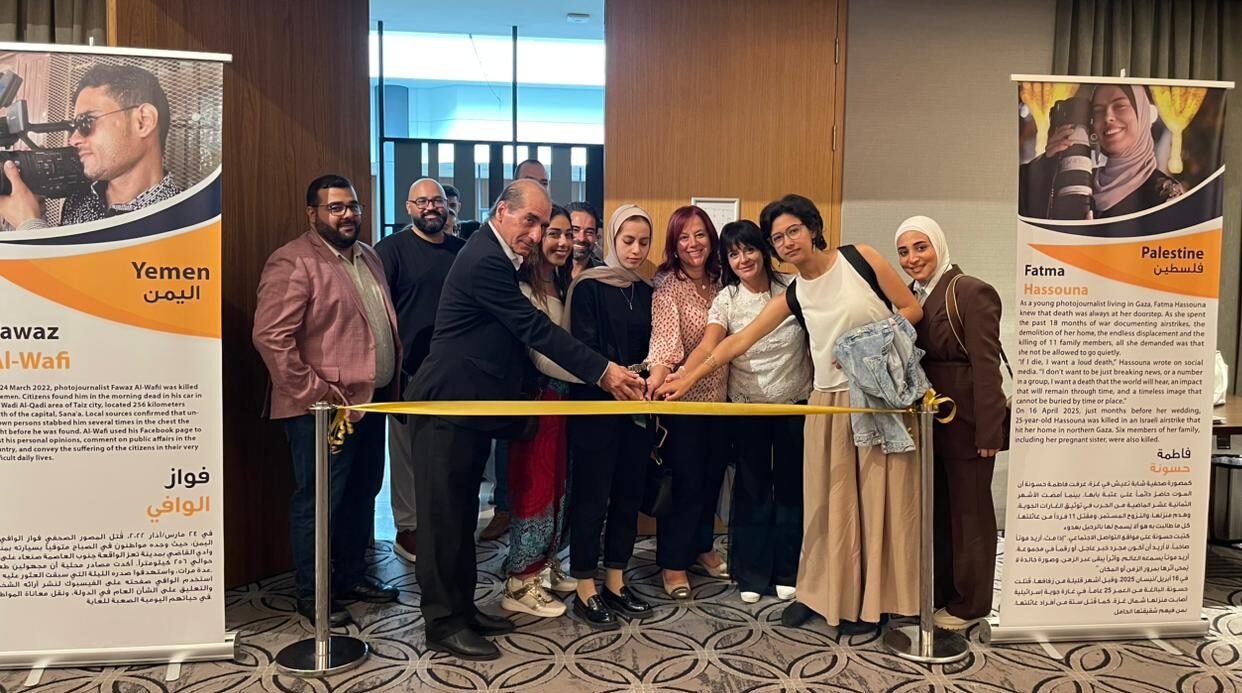GCHR’s Activities during the 60th session of UN Human Rights Council
28/10/2025
The Gulf Centre for Human Rights (GCHR) carried out advocacy on behalf of human rights defenders (HRDs) at the 60th session of the United Nations Human Rights Council (UNHRC) in Geneva which was held between 08 September to 08 October 2025.
The various activities were designed to get support from UN member states to help free detained human rights defenders and enhance the protection of public freedoms across the Middle East and North Africa (MENA). They also highlighted the need to end impunity and enforce accountability across the region.
Resolutions
GCHR’s priority resolution was on the “question of the death penalty”. The death penalty was a hard-fought resolution on a strong text between abolitionist states (the majority including the drafters of the resolution) and retentionist states who felt certain language pushed for abolition rather than “just” the respect of human rights during death penalty cases. The drafters did compromise to remove a list of certain crimes as not “most serious crimes”, for which the death penalty is reserved. GCHR made a positive impact by being the only CSO, in the absence of any state, that raised the absence of any mention of those sentenced for crimes committed as children. Language addressing this was consequently added to the resolution.
Due to schedule conflicts, GCHR only followed the initial discussions on the reprisals’ resolution, which specifically addresses reprisals for cooperating with UN mechanisms. Again, the issue of transnational repression was a key discussion point.
Side Events
On 12 September 2025, GCHR in co-operation with ALQST for Human Rights, Building and Wood Workers’ International (BWI), European Saudi Organisation for Human Rights (ESOHR) and MENA Rights Group (MRG), organised a side event focused on Saudi Arabia and entitled, “Human Rights Concerns in Saudi Arabia on the 20th Anniversary of the National Human Right Commission”. The event, which was moderated by Michael Khambatta, Geneva Representative for GCHR, included speakers Yahya Assiri of ALQST for Human Rights; Maryam Aldossari, a Saudi Academic; Duaa Dhainy of ESOHR; Paola Camilli of BWI; and Falah Sayed of MRG (the main photo).
The moderator and the speakers talked about the various violations, including the systematic use of arbitrary travel bans against human rights defenders and their families, persistent restrictions on freedom of expression and women’s rights, and an escalating use of the death penalty, including for offences that do not meet the “most serious crimes” threshold under international law and for offences allegedly committed when individuals were children. They also addressed migrant workers’ rights violations, including wage theft and abusive recruitment, and raised concerns over the independence and effectiveness of the Saudi Human Rights Commission (SHRC) twenty years after its establishment.
They called on the authorities to lift arbitrary travel bans and end reprisals; institute a moratorium on executions with robust child-rights safeguards, ensure effective remedies and wage recovery for migrant workers, and align the SHRC with the Paris Principles, noting credible civil-society analysis that the Commission has never sought accreditation from the Global Alliance of National Human Rights Institutions (GANHRI).

GCHR also co-sponsored a side-event on Bahrain’s ongoing human rights crisis with the Bahrain Center for Human Rights (BCHR), in cooperation with other international and regional partners, to shed light on the continuing deterioration of the human rights situation in Bahrain. The panel brought together civil society leaders, UN experts, and international organizations to highlight urgent concerns around political repression, discrimination, civic space, and the treatment of prisoners of conscience.
At the event, Nedal Al-Salman, Director of BCHR and Vice-President of FIDH, emphasised that the Bahraini people have been engaged in a decades-long struggle for equal rights, accountability and justice. GCHR’s Executive Director Khalid Ibrahim focused on the urgent need to secure the release of all prisoners of conscience, with particular emphasis on the case of prominent human rights defender Abdulhadi Al-Khawaja, founder of BCHR and co-founder of GCHR.
Statements at the HRC
On 17 September, GCHR delivered a statement at the interactive dialogue with the Working Group on Arbitrary detention on in cooperation with MENA Rights Group, and ALQST for Human Rights focusing on Saudi Arabia, notably on the case of child defendants at imminent risk of execution, such as Abdullah Al-Derazi, who was nonetheless executed on 20 October 2025.
On 17 September, GCHR delivered a statement in cooperation with ALQST for Human Rights on the interactive dialogue with the Independent Expert on Older Persons (IE) on her visit to Saudi Arabia. The statement highlighted the IE’s lack of access to older detainees at Al-Ha’ir prison as well as the fact that foreign domestic workers employed under the Kafala system are vulnerable to economic and physical abuse, trafficking and exploitation.

On 24 September, GCHR delivered a statement in the interactive dialogue on the Secretary-General’s report on reprisals. The statement noted ongoing reprisals in the UAE, Bahrain and Saudi Arabia, although in Saudi Arabia those reported on had been released, but remain silenced. GCHR urged the highlighting of countries where civil society no longer engages with the UN due to fear of reprisals.
On 29 September, GCHR delivered a statement at the UPR adoption for Kuwait. GCHR noted that Kuwait rejected all recommendations to adopt international legal instruments, end the use of the death penalty, resolve the status of the Bidoon community. It did accept a few recommendations on the Freedoms of Expression, Association and Assembly. GCHR and the Committee to Protect Journalists (CPJ) made a joint submission to the UN Universal Periodic Review of Kuwait for the 49th Session of the UPR Working Group.
NGO End-of-Session Statement
GCHR signed on to the HRC60: Joint NGO end-of-session statement with other partners including CIVICUS, FIDH and the International Service for Human Rights. The statement welcomes various Thematic Human Rights Resolutions and Advancements. It also mentioned missed opportunities, noting, “We regret that the Council failed to adequately respond to the grave human rights situations unfolding in Yemen, Libya, and across the MENA region.”




